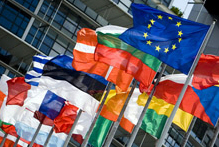
Typical street scene in Santa Ana, El Salvador. (Photo: iStock)
IMF Survey: EU to Channel €200 bln to IMF to Strengthen Global Safety Net
December 9, 2011
- Lagarde welcomes progress made by EU to enhance fiscal discipline
- Eurozone statement outlines plan to provide up to 200 billion euros to IMF
- Says hopeful other countries will “do their part”
Member states of the European Union plan to provide up to 200 billion euros to the International Monetary Fund (IMF) to reinforce the global lender as it helps tackle fallout from the European debt crisis and the ongoing global economic slowdown.

European Union flags fly outside parliament: the EU hopes the international community will also help (photo: Lex van Lieshout/ANP)
Brussels summit
The Eurozone leaders also laid out a new “fiscal compact” to prevent future debt run-ups and accelerated the start of a planned permanent 500 billion euro rescue fund.
European leaders meeting in Brussels agreed to make bilateral loans to the IMF of as much as 200 billion euros ($270 billion. These resources are expected to come from individual countries' reserves when needed, mostly via their national authorities, to the Fund's general resources.
The exact contribution is expected to be finalized within the next 10 days. IMF Managing Director Christine Lagarde said the decisions taken by European leaders at their summit in Brussels “are an important contribution to helping address the crisis facing the euro zone and strengthening the global economic recovery.”
In a statement, the EU’s Council said “euro area and other Member States will consider, and confirm within 10 days, the provision of additional resources for the IMF of up to EUR 200 billion (USD 270 billion), in the form of bilateral loans, to ensure that the IMF has adequate resources to deal with the crisis. We are looking forward to parallel contributions from the international community.”
Progress made
Saying it was “a step in the right direction”, Lagarde said she welcomed in particular the progress made in three critical areas:
• the agreement reached to enhance fiscal discipline and strengthen economic policy coordination in the euro zone.
• the decision to accelerate the entry into force of the European Stability Mechanism (ESM) treaty, which will help bolster the firewall against financial contagion.
• the commitment in the euro area statement to provide additional resources to the IMF of up to 200 billion euros.
The additional resources, she said, will enhance the IMF's capacity ”to fulfill its systemic responsibilities in support of its global membership--which is especially important given the ongoing economic slowdown and financial market tensions.
“I appreciate this demonstration of leadership from Europe, and I am hopeful that others will also do their part."
Lagarde has recently visited several major economies, including Japan, Russia, China, Mexico, and Brazil. In Brazil, she said the balance of global economic power was shifting and that “emerging economies are a key part of the solution to the global problems.”
IMF revamps toolkit
The IMF has revamped its lending toolkit to bolster its ability to meet the needs of its member countries as global growth continues to weaken. Since the crisis erupted in 2007, the IMF’s lending commitments have reached a record level of about $250 billion. This has included an increase in concessional lending to the world’s poorest nations.
The reforms, which have been under way for some time, come in response to calls from the Group of Twenty (G-20) industrialized and emerging market economies and the IMF’s broader membership for a stronger global financial safety net to help prevent crises.


